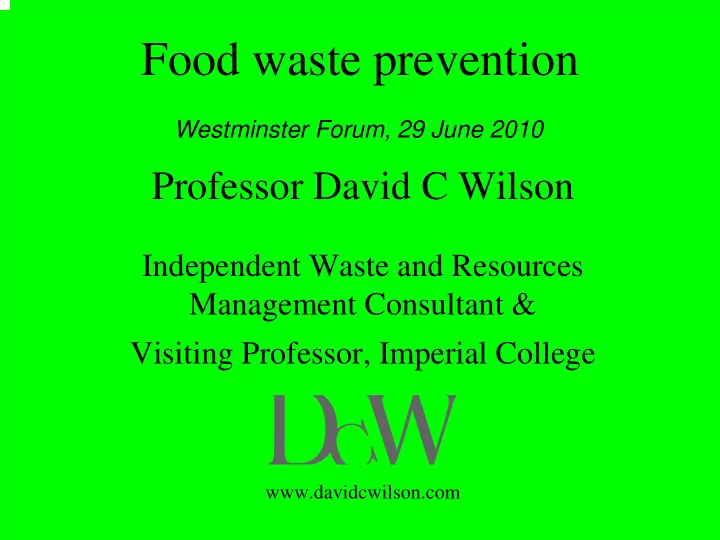

Food waste prevention Westminster Forum, 29 June 2010 Professor David C Wilson Independent Waste and Resources Management Consultant & Visiting Professor, Imperial College www.davidcwilson.com
The food we waste today • WRAP: – one third of all the food we buy – at least half of that food that could have been eaten – £680/ 4-person family/ year – levels similar for rich and poor • US: – 30% of food that is bought – $48 billion/ year – about $625/ family/ year
The food we used to waste • No WRAP data …. • Rich vs poor • Food scarce, expensive • Left-overs reused … • .. or fed to animals • Ladies: Leave some for ‘Mr Manners’ • Wartime: ‘A clear plate is a clear conscience’
Modern affluence has changed attitudes • UK household waste generation ( per capita per annum) – 1980 310 kg – 2000 510 kg • Everyone now wastes food, but .. • No longer anyone to eat the leftovers …. • … a few exceptions!
Is this just a rich country issue? • Good data has been hard to come by • New UN-Habitat book has changed that • Comparable data for 20 cities in 6 continents Reference: Scheinberg, A., Wilson, D.C. and Rodic L. (2010). Solid Waste Management in the World’s Cities . Published by Earthscan for UN-Habitat, March 2010. www.earthscan.co.uk/?tabid=102382
Comparing data across countries Income Waste Organic Organic waste level generation fraction generation Kg/capita/ year % Kg/capita/ year High 550 29 160 Middle 350 54 187 Low 240 70 170 Source: Scheinberg, A., Wilson, D.C. and Rodic L. (2010). Solid Waste Management in the World’s Cities . Published by Earthscan for UN-Habitat, March 2010. www.earthscan.co.uk/?tabid=102382
Detailed data for Malaysia (%) Organic waste High income Middle Low income category group income group group Food 36.91 45.63 49.06 (consumed) Food (not 1.9 1.58 0.32 consumed) Garden waste 11.26 8.64 5.94 Other organics 0.59 0.18 0.27 TOTAL 50.7 56.0 55.6 Source: Fauziah, S. H., Simon, C. and Agamuthu, P. Malaysian Journal of Science, 23(2): 61-70 (2005)
Does it matter that the ‘West’ wastes so much food? • If everyone consumed at ONE the UK’s current rate, we PLANET would need three Earths, LIVING not one • The food we eat accounts for 20% of the UK’s greenhouse gas emissions • So the food we squander accounts for around 5% of our total carbon footprint • Equivalent to taking 1 in 4 cars off the road
How do we move back to more sustainable living? • A very broad question… • … but behaviour change IS possible • e.g. UK recycling rates – Increased from a low of 6% to 38% in 12 years, Source: 1979 ISWA still rising Waste Minimisation Conference, Geneva
Influencing behaviour framework Enable (Make it easier) Catalyse Encourage Engage Is the package enough to break (Give the right (Get people a habit and kick Signals) involved) start change? Approach evolves as Source: Defra, Securing the attitudes and Future, 2005 Exemplify behaviours change over time (Lead by example)
Love Food Hate Waste www.lovefoodhatewaste.com • Partnerships with retailers • Handy tips • Food waste diary • Recipes for leftovers • Love food champions workbook • Separate food waste collection Enable • Focus on • Website saving money • Press and media • Add your voice Catalyse • Local campaigns Encourage Engage to the campaign • Education in • Feedback on schools performance Exemplify • Love Food Champions • Celebrity endorsement
Waste Prevention – its time has come • Top of the hierarchy for more than 30 years • We have paid lip service long enough • Time to take it seriously Source: Waste Strategy for England 2007. The hierarchy was first drawn in this format by Prof David C Wilson: ‘Stick or carrot? The use of policy measures to move waste management up the hierarchy’. Waste Management & Research (1996) 14, 385-398
Waste prevention requires action at all stages of the Extract raw resource cycle materials Supply / Produce Consume Discard Collect Purchase design, sustainable effective consumption repair & manufacture products & collection patterns re ‐ use & retail services mechanisms energy recovery / markets for re ‐ use Recover Disposal reduce waste to landfill Source : Social Marketing Practice and Brook Lyndhurst
Evidence on household waste prevention • Major evidence review for Defra • Key gap is measurement – Difficult to measure what isn’t there – Without proof of savings, difficult for local authorities to justify expenditure • www.rand.defra.gov.uk, click on ‘search’ and enter WR1204 as keyword Logo for the European • Waste Management & Research, Week for Waste Reduction special issue on waste prevention Source: www.ewwr.eu 28 (3), March 2010
In conclusion Summary • Food waste is a disease of affluence, of recent origin • Not yet afflicting the rest of the world • But our greed does have a global impact Looking forward • Behaviours can be changed • Prevention is the first priority • The supply chain needs to take responsibility
Thank you for your attention! www.davidcwilson.com waste@davidcwilson.com d.c.wilson@imperial.ac.uk
Recommend
More recommend